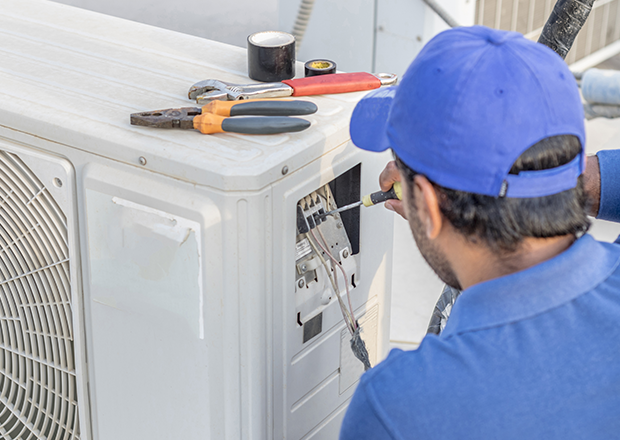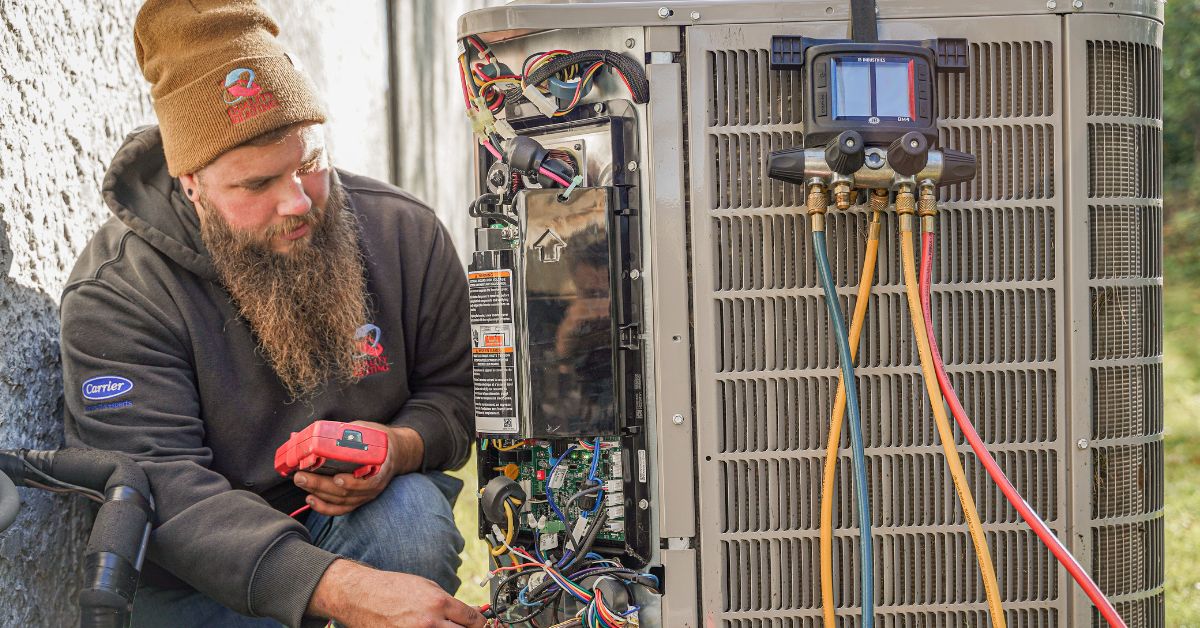The Value of Cooling And Heating Expertise: Uncovering Causes of Air Conditioner Troubles for Property Owners
Homeowners usually ignore the value of recognizing their HVAC systems. Identifying typical signs of air conditioning troubles can result in timely treatments. Concerns like not enough cooling or unusual noises are not just annoyances; they can indicate much deeper concerns. By discovering the root causes of these troubles, home owners can enhance system effectiveness and extend its life-span. What are one of the most widespread problems that can occur, and just how can they be effectively dealt with?
Usual Signs of Air Conditioning Troubles
How can homeowners determine problems with their air conditioning systems before they rise? Identifying usual indications of AC troubles is vital for prompt upkeep. One widespread indication wants air conditioning; if the a/c unit falls short to lower the interior temperature, it might indicate underlying issues. Unusual sounds, such as grinding or hissing, can likewise indicate mechanical failings or loose components - HVAC company. In addition, home owners ought to watch out for weird odors emanating from the unit, which could suggest mold and mildew growth or electric problems. Regular cycling on and off, understood as brief cycling, can indicate thermostat issues or refrigerant leaks. Additionally, an increase in power expenses without an equivalent rise in use may indicate ineffectiveness. By remaining sharp to these caution indicators, property owners can stop much more substantial concerns and costly fixings, ensuring their cooling systems operate effectively throughout the warmer months

Comprehending Refrigerant Issues
Refrigerant concerns can substantially impact the effectiveness of an a/c system. Property owners need to recognize the indicators of low refrigerant levels and the importance of spotting cooling agent leakages. Attending to these problems promptly can protect against more damages to the system and warranty top cooling efficiency.
Low Refrigerant Degrees
An usual issue that home owners may come across with their heating and cooling systems is low refrigerant degrees, which can substantially influence the system's efficiency and performance. Cooling agent is essential for the cooling process, soaking up warmth from interior air and releasing it outside. When degrees go down, the air conditioning system struggles to cool the room successfully, resulting in boosted energy consumption and prospective system pressure. Signs of reduced cooling agent include inadequate cooling, longer run times, and ice development on the evaporator coils. Homeowners might also discover unusual noises as the compressor works harder to make up for the shortage. It is essential for home owners to comprehend the value of preserving proper refrigerant degrees to assure peak HVAC performance and long life.
Refrigerant Leaks Discovery
Where might a property owner begin when faced with the possibility of refrigerant leaks in their heating and cooling system? The initial step includes keeping track of the system's performance. Signs such as decreased cooling efficiency, ice development on coils, or hissing audios might suggest a refrigerant leak. Homeowners should also look for visible indicators of oil deposit, often an indication of a leak. Using a refrigerant leakage detector can give even more exact identification. If uncertainties continue, seeking advice from a qualified a/c specialist is vital, as they possess the knowledge and tools to locate leaks efficiently. Trigger detection and repair service of refrigerant leakages not only boost system effectiveness however also stop prospective environmental damage, making it a crucial aspect of cooling and heating upkeep.
Electric Failures and Their Effect
Electric failures can significantly affect HVAC systems, especially via concerns like breaker breakdowns and faulty wiring. These troubles not only disrupt the system's performance however can likewise result in costly repair services and safety dangers. Recognizing the ramifications of such failures is vital for homeowners to preserve an effective and secure cooling and heating atmosphere.
Circuit Breaker Issues
How can breaker problems impact the effectiveness of a cooling and heating system? Circuit breakers act as vital safety and security tools that take care of electrical flow to a/c units. If a breaker trips regularly, it interrupts power supply, causing inconsistent heating or air conditioning. This can create considerable stress on the system, resulting in ineffective procedure and possible damage to components. Property owners might discover increased energy costs due to the heating and cooling system's battle to maintain preferred temperature levels. Furthermore, repeated disruptions from stumbled breakers can shorten the life expectancy of the air conditioner system, calling for expensive repair services or substitutes. Routine maintenance of breaker is critical, as it guarantees a steady power supply, eventually boosting the overall effectiveness of the HVAC system.
Faulty Electrical Wiring Outcome
Frequently overlooked, malfunctioning circuitry can have dire consequences for HVAC systems. Electrical wiring issues might bring about brief circuits, resulting in regular breakdowns and enhanced repair service expenses. Additionally, inappropriate electrical wiring can trigger inefficient energy usage, bring about higher utility bills and strain on the system. In serious instances, damaged electrical wiring can set off electric fires, posing a significant safety and security danger to house owners. Moreover, these electrical failures can damage cooling and heating parts, causing costly replacements or comprehensive repairs. Home owners should focus on normal evaluations by qualified specialists to determine and remedy electrical wiring issues before they escalate. Recognizing the ramifications of defective wiring can aid ensure the longevity and safety and security of cooling and heating systems, ultimately shielding both the home and its occupants.
Clogged Filters and Their Consequences
While lots of home owners may ignore the importance of regular filter maintenance, stopped up filters can lead to considerable effects for cooling and heating systems. When filters end up being blocked with dust, dirt, and particles, air flow is limited. This reduction in airflow forces the system to function harder, causing boosted energy intake and potentially greater utility bills. Gradually, this strain can trigger damage on parts, causing early system failing.
In addition, clogged up filters can endanger interior air high quality. Pollutants and allergens may distribute throughout the home, exacerbating respiratory system issues and allergic reactions for residents. Additionally, insufficient air flow can cause the evaporator coil to ice up, leading to costly fixings and ineffective click for more info cooling performance. Routinely changing or cleansing filters is a basic yet vital upkeep task that can help assure the longevity and efficiency of HVAC systems, ultimately benefiting both the homeowner's comfort and their finances.

Thermostat Malfunctions Explained
What takes place when a click over here thermostat malfunctions can substantially affect both convenience and power effectiveness in a home (AC repairman). A damaged thermostat may fall short to precisely review the temperature level, resulting in overcooling or not enough cooling. This inconsistency can cause discomfort for occupants and cause greater energy costs, as the HVAC system works more challenging than necessary
Common problems include dead batteries, which can make electronic thermostats inoperative, and loose wiring that disrupts interaction between the thermostat and the a/c unit. Furthermore, obsolete or poorly adjusted thermostats find more information might not react appropriately to temperature level changes, even more aggravating power ineffectiveness.
Home owners should be cautious for signs of malfunction, such as inconsistent temperatures or unexpected power expenses. Regular checks and understanding of the thermostat's capability can assist identify problems early, guaranteeing peak efficiency of the cooling and heating system. Addressing thermostat issues without delay is important for maintaining a comfortable living atmosphere and handling energy intake effectively.
The Duty of Routine Upkeep
Regular upkeep plays a necessary function in ensuring the durability and efficiency of a/c systems. Homeowners who focus on regular checks can avoid small issues from intensifying into costly repair work. Routine upkeep generally includes tasks such as cleansing filters, evaluating ductwork, and inspecting refrigerant degrees. These tasks aid maintain excellent air movement and system efficiency, minimizing energy intake.
A properly maintained Cooling and heating system runs much more successfully, offering constant comfort throughout the home. Regular tune-ups can also extend the life expectancy of the device, leading to considerable financial savings over time. Homeowners are urged to set up specialist examinations at the very least yearly to recognize prospective troubles early.
On top of that, many makers need routine upkeep to copyright service warranties, making this method not just valuable yet frequently necessary. Overall, recognizing the significance of regular upkeep encourages house owners to protect their cooling and heating systems against unanticipated failures and enhance their financial investment in home comfort.
Regularly Asked Inquiries
Exactly How Can I Boost My Air conditioner's Power Effectiveness?
Improving an air conditioning's energy performance involves normal maintenance, cleansing or replacing filters, securing ductwork, making sure proper insulation, using programmable thermostats, and organizing specialist inspections to identify and correct prospective concerns affecting performance.
What Is the Lifespan of a Typical A/c System?
A common air conditioning unit has a life-span of 15 to two decades, relying on upkeep, use, and ecological factors. Normal maintenance can substantially expand its operational life and improve overall efficiency.
When Should I Change My A/c System?
An air conditioning system ought to typically be replaced every 10 to 15 years. Indicators for substitute include regular repair work, climbing energy costs, and not enough air conditioning, showing that an upgrade might be more cost-efficient and effective.
Can I Repair Air Conditioning Troubles Myself?
Yes, people can repair a/c issues themselves by inspecting filters, ensuring power supply, and examining for noticeable problems (HVAC company). Nonetheless, complicated issues often call for expert support for exact diagnosis and risk-free fixing, ensuring optimal system performance
Exactly how Do I Pick a Reputable Cooling And Heating Specialist?

To select a trustworthy HVAC specialist, one ought to seek suggestions, inspect on the internet evaluations, validate licenses and insurance, assess experience, and request comprehensive estimates to ensure quality service and reasonable pricing before making a choice.
Conclusion
To sum up, a strong understanding of heating and cooling systems makes it possible for property owners to properly diagnose and attend to common air conditioning problems. Acknowledging indicators such as insufficient cooling or climbing energy expenses enables timely treatments, which can significantly enhance system performance and durability. By remaining educated concerning potential issues like cooling agent leakages, electric failures, and clogged up filters, homeowners can take aggressive procedures to preserve their systems, eventually guaranteeing comfort and advertising a healthier living environment. Normal upkeep stays key to this undertaking.